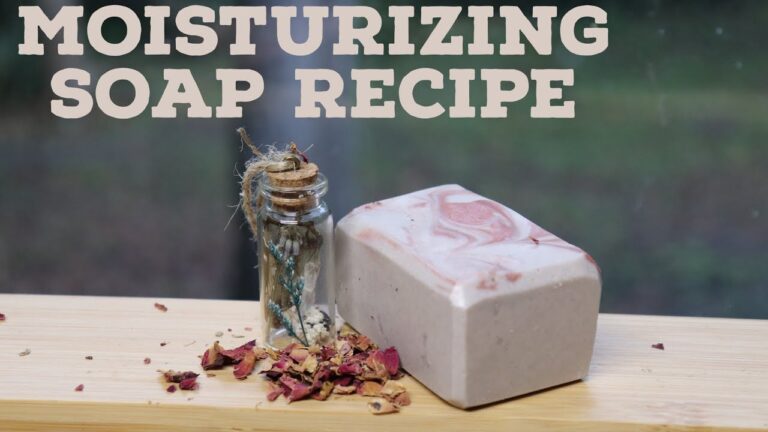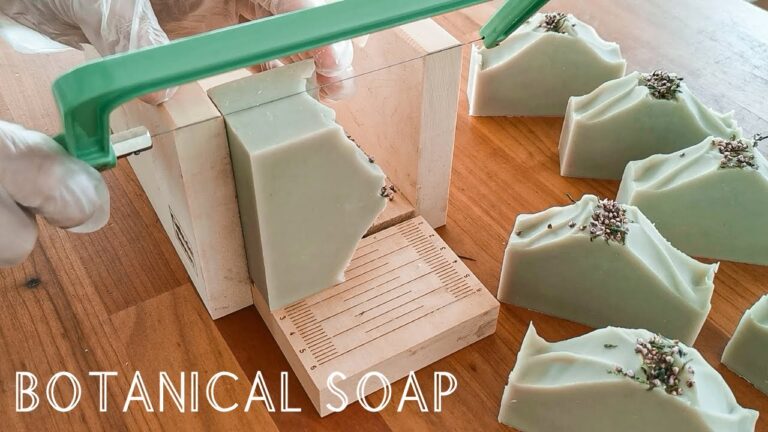When it comes to choosing a hydrating natural soap, the right ingredients can make all the difference. Whether you have dry or sensitive skin, knowing what to look for can help you find a soap that will leave your skin feeling moisturized and refreshed. From nourishing oils like coconut and avocado to soothing ingredients like aloe vera and shea butter, we’ve rounded up the top ingredients to look for in hydrating natural soaps. Say goodbye to dry, irritated skin and hello to a natural, moisturizing cleanse.
Advantages
- Shea butter: Known for its moisturizing properties, shea butter helps to hydrate and nourish the skin, leaving it feeling soft and smooth.
- Coconut oil: Coconut oil is rich in fatty acids that help to moisturize and protect the skin, keeping it hydrated throughout the day.
- Aloe vera: Aloe vera is a natural ingredient that soothes and hydrates the skin, making it ideal for dry or sensitive skin types.
- Olive oil: Olive oil is a natural emollient that helps to moisturize and soften the skin, leaving it feeling hydrated and refreshed.
- Jojoba oil: Jojoba oil closely resembles the natural oils produced by the skin, making it an excellent ingredient for hydrating and nourishing the skin.
Disadvantages
- Limited availability: Some natural ingredients used in hydrating soaps may not be easily accessible, making it difficult to find these soaps in stores or online.
- Allergic reactions: While natural ingredients are generally gentle on the skin, some individuals may still experience allergic reactions to certain botanicals or essential oils used in hydrating soaps.
- Higher cost: Hydrating natural soaps tend to be more expensive than conventional soaps due to the quality of ingredients used, making them less budget-friendly for some consumers.
What makes soap moisturizing?
Moisturizing soaps are formulated with glycerine, also known as glycerol, to provide hydration to the skin. This ingredient creates a protective film on the skin’s surface, helping to lock in moisture and attract additional hydration from the air. Glycerine is a hygroscopic chemical that effectively moisturizes the skin, leaving it feeling soft and supple.
What are the key things to consider when choosing natural soap?
When searching for natural soap, it’s important to scrutinize the ingredients list and opt for products made with high-quality natural ingredients like oils (such as olive oil and coconut oil), essential oils, and herbs. Steer clear of soaps containing synthetic materials, artificial fragrances, dyes, parabens, or other harmful chemicals. Prioritizing clean, pure ingredients will ensure that you’re getting a natural soap that is gentle on your skin and free from potentially harmful additives.
How can I improve the moisturizing properties of a soap?
To make a soap more moisturizing, consider adding ingredients like shea butter, coconut oil, or glycerin which have hydrating properties. These ingredients help to lock in moisture and prevent the skin from drying out. Additionally, using a lower concentration of harsh chemicals and fragrances can also help maintain the skin’s natural oils and prevent moisture loss. Incorporating natural oils and butters into the soap-making process can create a luxurious and nourishing bar that leaves the skin feeling soft and hydrated.
Essential Ingredients for Moisturizing Natural Soaps
Discover the essential ingredients for creating luxurious and moisturizing natural soaps that will leave your skin feeling soft and rejuvenated. From nourishing oils like coconut, olive, and shea butter to hydrating ingredients such as aloe vera and glycerin, these key components work together to provide a rich lather and deep hydration. Elevate your soap-making game with these essential ingredients and treat yourself to a spa-like experience every time you wash your hands or bathe.
Unlocking the Power of Hydration in Natural Soap Making
Discover the secret to radiant, healthy skin with our natural soap making techniques that focus on the power of hydration. By carefully selecting ingredients that nourish and moisturize the skin, our soaps leave you feeling refreshed and rejuvenated. Say goodbye to dry, dull skin and hello to a radiant glow with our hydrating soap formulas.
At the heart of our natural soap making process is the belief in the power of hydration. We carefully craft each bar of soap to ensure it retains its moisturizing properties, leaving your skin feeling soft and supple. Our dedication to using only the finest ingredients means you can trust that our soaps will provide your skin with the hydration it needs to look and feel its best.
Experience the difference that hydration can make in your skincare routine with our natural soaps. Unlock the power of hydration and treat your skin to the nourishment it deserves. Say goodbye to harsh chemicals and artificial ingredients, and embrace the natural beauty of hydrated skin with our luxurious soap creations.
In summary, when shopping for hydrating natural soaps, keep an eye out for ingredients such as shea butter, coconut oil, and glycerin. These powerhouse ingredients work together to nourish and moisturize the skin, leaving it feeling soft and supple. By choosing natural soaps with these key ingredients, you can ensure that your skin stays hydrated and healthy, without any harsh chemicals or artificial fragrances. So, next time you’re in the market for a new soap, be sure to check the label for these hydrating ingredients to keep your skin feeling its best.



